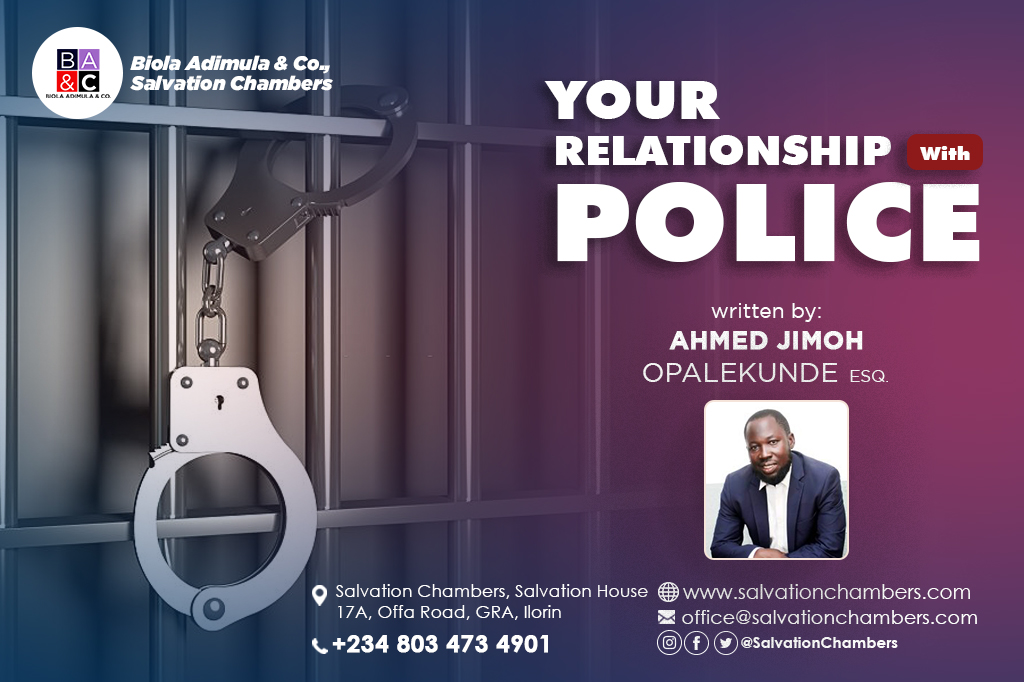The relationship between you and the police need to be clarified so as to know how to conduct yourself when relating with the Nigerian Police. There are some laws enabling the police; these are as follows:
ENABLING LAWS
- Constitution of The Federal Republic on Nigeria 1999 (As Amended)
- Penal Code
- Criminal Code
- Administration of Criminal Justice Act
- Police Act
Section 214(1) of the Constitution establishes the Nigerian Police Force.
Functions and Powers of Police in Nigeria.
The functions of Nigerian Police are as follows:
- Crime prevention
- Protection of lives
- Property protection
- Order preservation
- Offenders arrest
- Crime detection
- Military duties
- Prosecutions
- Person identification
- Search through belongings[1]
‘Police is your friend’
The Nigerian Police Force exists to protect the safety and security of the lives and property of Nigerians. ‘To make Nigeria safer and more secure for economic development and growth; to create a safe and secure environment for everyone living in Nigeria’.
When you come across Police officers who have impressed you in the discharge of their duties, as stated above, thank them and let them know that you appreciate them, and you can also contact the Police reporting channels to commend specific officers. Make a note of their names and what they did that was so special. Positive feedback can help in changing the ‘culture’ of the Nigerian Police Force.
Where you experience Police Brutality, you can make complaint against such acts.
How to Make Complaint Against Police Officers in Nigeria
Police brutality or police violence is legally defined as a civil right violation where law enforcement officers exercise undue or excessive force against a subject. This includes, but is not limited to, bullying, physical or verbal harassment, physical or mental injury, property damage, and death.[2]
What can you complain about?
You can make complaints for unprofessional conduct carried out by police officers. The complaints must be against a police officer in his/her official capacity or personal capacity, or against actions carried out by the Police generally.
How to make a complaint against police brutality?
Below are the steps you should follow when you want to make a complaint about the police:
Step 1 – This is the first and most important thing – DO NOT ANTAGONISE POLICE. If you are upset or unhappy do not get into an argument with them, you need to ensure that your safety is paramount. Be respectful, make your point, but don’t insult or abuse a police officer. Most policemen are armed and getting into an argument with an armed individual is never a good idea.
Step 2 – Do not threaten Police, even if you intend to make a complaint do not use it as a threat to goad them.
Step 3 – Take note of the Policeman’s name, it is written boldly on their uniform. Note down the date, time and place of commission of the issue you are complaining about.
Step 4 – Write a covering letter detailing the nature of your complaint and what transpired. If you have witnesses to the act complained about, have the witness write a statement as well. Put all your contact information (and those of the witness if any) on the correspondence (however, if it is a sensitive issue you may decide to make the complaint anonymously).
Step 5 – Send it to the Complaint Response Unit of the Nigerian Police Force.
Step 6 – Ensure you get confirmation of receipt of your complaint, if not, follow up with them via their dedicated contact channels.
N.B
The information here is just for the public digest and not for professional engagement.
WITHOUT PREJUDICE.
[1] https://www.legit.ng/1207612-top-10-functions-nigerian-police-force-history.html
[2] Emesowum, Benedict (5 December 2016). “Identifying Cities or Countries at Risk for Police Violence”. Journal of African American Studies. 21 (2): 269–281. doi:10.1007/s12111-016-9335-3. ISSN 1559-1646.

